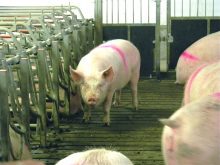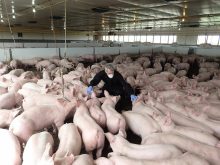Consumers eating average amounts of Irish pork with 10 per cent contamination by cancer-causing dioxins should not have concerns for their health, the EU’s leading food safety agency said Dec. 10.
In response to a request by the European Commission, the Italy-based European Food Safety Authority (EFSA) said it had examined several exposure scenarios for consumers eating pork with differing dioxin concentrations.
For the likeliest scenario, a daily consumption of 10 per cent contaminated Irish pork for a mean consumer of pork fat over 90 days at the highest recorded dioxin concentration, it said: “The body burden would increase by approximately 10 per cent.”
Read Also

Mazergroup’s Bob Mazer dies
Mazergroup’s Bob Mazer, who helped grow his family’s company into a string of farm equipment dealerships and the main dealer for New Holland machinery in Saskatchewan and Manitoba, died July 6 from cancer.
“EFSA considers this increase in body burden of no concern for this single event,” the agency said in a statement.
Animal feed tainted with dioxins was recently given to 10 pig farms in Ireland at levels about 100 times the maximum permitted in the European Union.
Irish authorities ordered the food industry to recall all domestically produced pork products because of the risk of dioxins in food.
Extreme cases – daily consumption of 100 per cent contaminated Irish pork with high-level consumption rates over the same period and dioxin concentration – “would reduce protection, but not necessarily lead to adverse health effects.”
Such cases are unlikely, it added.
Not seen in Canada
The Canadian Food Inspection Agency is monitoring Ireland’s pork recall, but for now said Canada has “no record of receiving direct shipments of pork, pork products or feed” from Ireland.
But if CFIA learns that pork from Ireland may have gone into distribution for export to Canada, “we will take immediate action to advise the public and verify the effective removal of the product from the marketplace,” the agency said Dec. 9.
The Irish Times reported Dec. 10 that used oil from electricity transformers may have caused the dioxin contamination in animal feed on the affected farms.
Without citing sources, the report said the contamination may have been caused by waste oil originating in Northern Ireland that should have been stored or destroyed. Farm Ministry officials were not immediately available for comment.
The growing crisis escalated further Dec. 9 after authorities said three cattle herds in Ireland were contaminated with dioxins.
But Ireland said there was no need to recall any Irish beef products because the level and extent of contamination in the affected animals was much lower than at the pig farms.


















